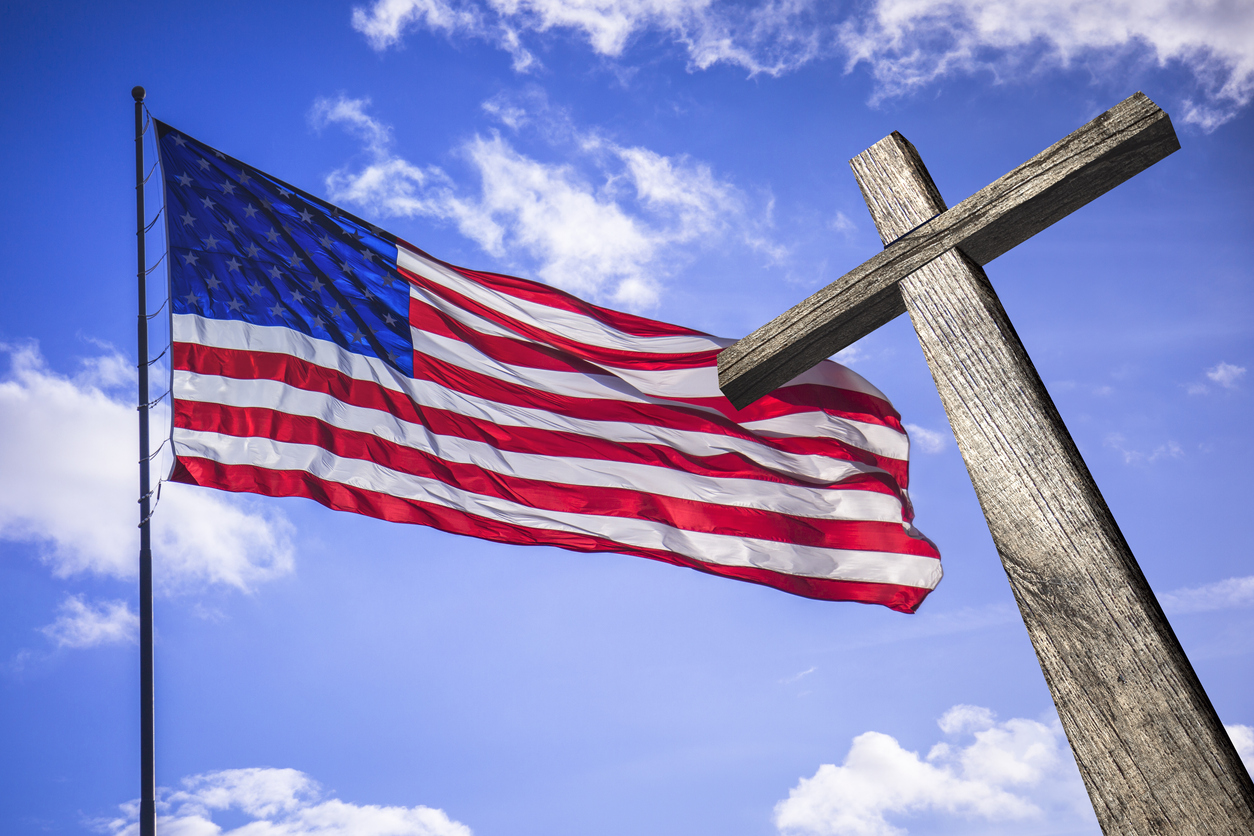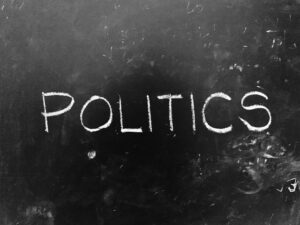It is not hard to detect almost a sigh of relief amidst the left-wing panic over the supposed attempt by so-called “Christian nationalists” to return American to a more religious time. At just the moment when progressivism is experiencing a political backlash for its anti-Semitic sympathies, its opposition to controlled immigration, and its costly net-zero agenda, the idea that a group of white, right-wing extremists are plotting a theocratic revival of the country must seem like … well … a Godsend.
The left’s handwringing over this alleged conspiracy actually dates back to just before Covid. Ever since late 2019, America Magazine, the Center for American Progress, the New Yorker, NPR, and other liberal opinion makers have been breathlessly reporting every conceivable sign that the Christian right has mobilized to reverse the secular progress made possible by the New Deal and the Great Society.
But the paranoia really kicked into high gear last November when the leftist press began claiming that Republican representative Mike Johnson’s ascension to the post of House speaker had been engineered by a secret network of Christian activists. If the election of a seeming unknown comes as a surprise to the larger world, the Nation warned its readers, it does not to the oil barons and other fundamentalist power brokers on the right: “They’ve been grooming Johnson for this position for many years.” And in a piece for Salon, former Playboy White House correspondent Brian Karem declared that the new speaker, working secretly with Christian nationalist allies, constituted a “bigger threat to America than Hamas could ever be.”
More recently, we have the December announcement from liberal filmmaker Rob Reiner that his latest documentary, tentatively titled “God and Country,” will be released to theaters in February. Describing his production as a look “at the implications of Christian nationalism,” Reiner promises audiences it will show “what happens when a faith built on love, sacrifice, and forgiveness grows political tentacles, conflating power, money, and belief into hyper-nationalism.”
The timing of the documentary’s release is likely not a coincidence. Having argued that the Republican party is under the influence of Christian nationalists and having identified the shadowy cabal’s agenda as returning the U.S. to a more explicitly and repressively religious era, Democrats clearly plan to hype the joint claims as much as possible before the November elections.
The left is right about one thing: Christian nationalism does exist. Which is to say that it always has been, and continues to be, an important intellectual movement in U.S. history. But for Democrats to suggest that the heirs to this tradition would want to impose a more religious form of government today ignores the fact that even in more religious times Americans never had, or wanted, such a government.
Early American Christians were sufficiently versed in the history of Europe’s Thirty Years’ War (1618-1648) to know that any effort to make their Constitution and Bill of Rights overtly theological could well prompt an ugly struggle among the country’s various denominations to dictate the final draft. Even worse, it might produce the very kind of European state religion which had prompted so many religious minorities to seek freedom of worship in the New World. That is why, for the three centuries from the founding of Harvard until World War I, the Protestant clergy running nearly every U.S. college and university never used their influential platforms to advocate for a more overtly Christian government.
Down though American history, the goal of Christian nationalists has always had much less to do with forcing the state to echo their religious convictions than with minimizing the ways the state might compel them to compromise those convictions. They especially wanted to make it possible for a Christian to serve or to work in government without having to violate his or her faith.
Probably the best-known result of such efforts is the body of law surrounding conscientious objection to war. As far back as the American Revolution, states such as Pennsylvania allowed those who believed any killing immoral to avoid joining local militias in return for paying a fine equal to the time they would have spent drilling. During World War I conscientious objectors were permitted to serve the armed forces in noncombatant roles, such as ambulance driver, and eventually to become either auxiliary farmhands in the U.S. or relief workers in war-torn parts of Europe.
With the Second World War came the option to join the Civilian Public Service (CPS) as a firefighter, mental health worker, conservationist, or in some other socially needed capacity. Religious civilians who objected to funding combat by buying war bonds were provided alternative savings vehicles.
Today, the spirit of Christian nationalism is very much alive in events like last October’s sixth annual conference on “Christianity and National Security” in Washington, DC. Sponsored by the Institute for Religion and Democracy, it brought together Georgetown professor Matthew Kroenig, Hudson Institute Senior Fellow Rebeccah Heinrichs, former U.S. Special Envoy J. Peter Pham, and other experts to discuss the intersection of Christian ethics and American foreign policy. Among the topics they addressed were how to live one’s faith while representing the U.S. government in a country with different values, what policymakers can learn from the Christian concept of a “just war,” and what individual Americans can do to help other peoples displaced by war.
Because of their desire to preserve the believer’s ability to express his or her sense of God’s calling, no matter how it may differ from what is most convenient for the state, Christian nationalists generally share in social conservatism’s advocacy of small government, free markets, and traditional morality. But whereas the social conservative tends to stress the need for large institutions to reflect and promote that morality, the Christian nationalist places a greater emphasis on the simple freedom to go wherever the spirit leads, regardless of what others might believe.
Just as the seventeenth-century Puritan radicals understood that everyone’s life has the potential to help incarnate a better — if unforeseeable — world, so the Christian nationalist measures the welfare of a nation by the extent to which its people are allowed to serve God’s will as they understand it. A very old idea in American history, indeed the one idea that all the early Christian colonies would have either subscribed to or at least respected, despite their denominational differences.
The current progressive demonization of Christian nationalism would clearly have baffled those non-Christians in times past who understood that the freedoms it created in the U.S. could not only be enjoyed by citizens of all faiths but even guide other countries in how to better reconcile religion and government. When it was learned, for example, that First Dutch Reformed Church pastor and U.S. Congressman Julius Hawley Seelye would stop in Bombay on his 1872–73 around the-world tour, educated Hindus prevailed upon him to deliver a series of lectures which were published widely throughout India.
Twenty years later, Chicago hosted the World’s Parliament of Religions as the centerpiece of its four-hundred-year anniversary of Columbus’ discovery of the New World, in part to satisfy the growing curiosity about Christian nationalism in places as far away as China. The event attracted seven thousand participants representing faiths from every part of the world and was covered for seventeen days on the front pages of U.S. newspapers from coast to coast.
In our own time, the journal Providence carries on the Christian nationalist tradition of seeking ways to maximize spiritual freedom in the political realm, both at home and abroad. Its contributors include journalist Fred Barnes, who most famously appeared as a regular panelist on TV’s McLaughlin Group, and the Wall Street Journal’s Global Views Columnist, Walter Russell Mead.
All this is not to say that Christian nationalism has ever represented some kind of one-world philosophy or followed the Enlightenment tendency to see all religions as the same. Self-declared Christian nationalists are, and always were, Bible believing followers of Jesus. But unlike their current progressive attackers, they have long understood that it is far more dangerous for government to command a better society than to allow its citizens to build it by their own lights.





